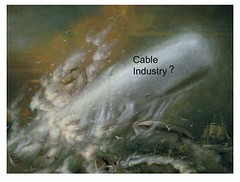Haven’t they been punished enough? Inmates in our nation’s prisons may find themselves without over-the-air television next February, unless Congress acts to fill a gap in the subsidy program for TV converter boxes. That’s right: according to a story run last week by Associated Press, “the upcoming switch to digital television is presenting a challenge to prison officials who want to make sure prison TVs are up and running. When broadcasters make the switch in February, televisions that aren’t hooked up to cable, satellite or a converter box will be reduced to static”.
The reason? Under the converter box subsidy program established by Congress, prisons are not eligible for the $40 subsidy for the converter boxes needed to let old televisions pick up broadcast signals after next February. That means — unless prison officials somehow find $40 elsewhere — or unless their penal institution has a cable or satellite subscription — incarcerated murderers and thieves will be forced to watch static.
Honest to god. I’m not making this up. This was an actual news story. The AP story went on to explain that “[w]hile TV might seem like an undeserved luxury for inmates, both prison officials and prisoners said the tube provides a sense of normalcy.”
Oh, now I understand. “Normalcy.” I didn’t understand that prison is supposed to provide a sense of normalcy.
Excuse me while I sit in stunned silence for a moment.
One interesting side note. I found the AP story on the website of WYFF in Greenville, SC, which — perhaps not surprisingly — is an over-the-air TV station. Go figure.


 The Technology Liberation Front is the tech policy blog dedicated to keeping politicians' hands off the 'net and everything else related to technology.
The Technology Liberation Front is the tech policy blog dedicated to keeping politicians' hands off the 'net and everything else related to technology.